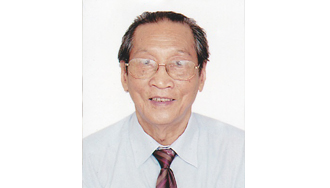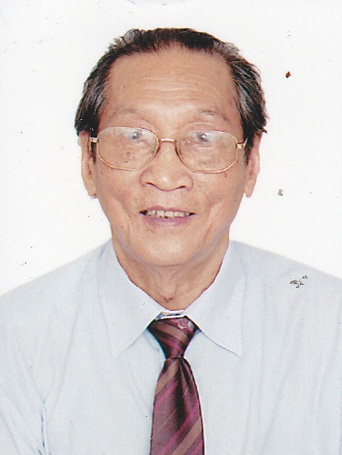
In early 2015, I happened to meet Professor Bui Khanh The inConference on Exchange and Promotion of Vietnamese and World Literatureorganized by the Vietnam Writers Association in Hanoi. I was a bit surprised and suddenly thought, when was Professor Bui Khanh The admitted to the Vietnam Writers Association without me knowing? Is it too late to congratulate him now?
Perhaps realizing my surprise, Professor Bui Khanh The happily introduced:
- I am here as a member of the Ho Chi Minh City National Studies Center. For the first time in my life, I received the title of writer from the invitation of the Organizing Committee.
So that's it! I saw that Professor Bui Khanh The was excited about the title of writer. To be fair, if Professor Bui Khanh The had followed his old career, he would certainly be both a teacher and a translator now and of course would also be a member of the Vietnam Writers Association under the Translation Council. Because he is very good at Russian. For nearly half a century, he has been a translator of many famous books.Soviet literature(SO Melichnubarov),History of Soviet literature(complete two volumes, 1961),Art forms(V. Koginov, 1963).

Professor, Doctor, People's Teacher Bui Khanh The
But the fate of a researcher came to him. Therefore, although he was a Russian speaker, he fumbled around, reading books and doing research on his own to eventually become a linguistics professor. His path was not really smooth, because right from the starting line, he was not a person who had received formal training in specialized knowledge. But with the spirit of self-study and research, with his rich Russian language, he approached and increasingly delved into the new field that fate had brought to him. When I entered university, he was no longer a Russian lecturer but a lecturer at the Department of Linguistics, Faculty of Literature, Hanoi National University. The part he was responsible for teaching was syntax. Our class had many memories with him. Those were the arduous memories of the war period, studying while running away from the enemy. When evacuated to Ha Tay, when fleeing to Hung Yen and then Ha Bac... Yet the knowledge he taught was not lost along the way. On the contrary, the bombs and bullets made us teachers and students more enthusiastic and determined. Until now, I still cannot forget the passionate lectures of Professor Bui Khanh The back then. There were many days, in the scorching summer sun, without wind or electric fans, the class of more than ten people in a private house was still caught up in the passion of the scientific world. He enthusiastically introduced to us some Russian books, the latest works that he had just updated. At that time, knowing Russian was a huge advantage because most of the scientific research achievements were acquired by Vietnamese people (in the northern provinces) through this gateway. Russian was approached by our generation as the voice of peace, friendship and the most important tool to open the door to the world. With that awareness and with the guidance of the teachers, from the second year we began to practice reading specialized books in a foreign language. Of course, at that time, Professor Bui Khanh The, both as a linguistics lecturer and as a Russian expert, had a great influence on our future orientation. He not only taught us professional knowledge but also instilled in us a "passionate" love and admiration for the distant Russia.
Combining theory and practice, we started our internships right from the second year. In the evacuation situation, our topics often "traveled" to rural areas. Professor Bui Khanh The enthusiastically took us to kindergarten classes to open the door to language research with a special subject, which was the language of children under 6 years old in the Van Giang and Hai Hung areas (old). Honestly, at first, not many of us were interested, but later, thanks to his perseverance and carefulness, Professor Bui Khanh The pulled us into the project. After the liberation of the South, the research continued to expand to the Hanoi area. Some of the data that the student classes collected at that time was later used by people to make LATS.
Because I knew and worked with Bui Khanh The many times since the evacuation, when I was writing my graduation thesis, I accepted him as my supervisor. However, we had only started working for a few months when the South was liberated. Originally a regrouped cadre, he enthusiastically volunteered to follow the Party's call to build new universities in the South. It can be said that he was one of the few scientific cadres from the North who was present in Ho Chi Minh City right from the beginning when the country was just unified. With his extensive work and experience, he was nominated as Vice President of Ho Chi Minh City University right from its establishment and was also the one who made the first contribution in building the linguistics department at this school.
Despite being busy with many administrative tasks, but still maintaining the passionate style from his youth, Professor Bui Khanh The always diligently and carefully devoted his remaining time to linguistics. Now, standing in a new area, he quickly switched to bilingual research and became a leading expert on Cham language and culture as well as the languages of ethnic minorities in the southern provinces. With his practical knowledge and available Russian, in 1979, he joined a joint research group of Vietnamese - Soviet scientists (1979) opening a new chapter in international research cooperation on languages in Vietnam.
What is more noteworthy is that, in addition to research works on bilingualism, languages, culture of ethnic minorities, dictionaries, he also joined hands with other writers and researchers to write the book series Cultural Geography of Saigon - Ho Chi Minh City (edited by Professor Tran Van Giau and researcher Tran Bach Dang) with the language section: From Saigon dialect to Ho Chi Minh City dialect. Then there was the article Saigon dialect at the transitional period in the process of Vietnamese literary language on the occasion of the 300th anniversary of Ho Chi Minh City and a number of books on culture and history that were loved by many readers. These are the books National Identity in Culture and Arts (co-written with Anh Duc and Bui Dinh Thi), That Autumn (co-written with Tran Bach Dang). Recently, he also published the book Linguistic and Cultural Style (Ho Chi Minh City General Publishing House). This book is a collection of his articles on the merits and contributions of his predecessors such as: Hoang Xuan Han, Nguyen An Ninh, Truong Vinh Ky, Tran Huy Lieu... That shows that he not only has a deep knowledge of his profession but also a wide range of interdisciplinary knowledge. He has known how to utilize and promote the potential of that knowledge to serve science and life.
Looking at his appearance, few people would imagine Bui Khanh The to be a professor because his appearance is not imposing, his gestures are gentle and modest. This quality is partly due to his "natural nature", but on the other hand, it is due to his regular training. Therefore, since I met him, I have never seen him raise his voice. Even in scientific conferences, when he disagrees with others, he always uses a calm voice to explain and prove his arguments, not using "big words". If he meets a hot-tempered person who speaks too harshly to him, he just smiles and calms him down. Therefore, he is a very approachable person and easy to share with colleagues.
To his students, Professor Bui Khanh The is an enthusiastic and highly responsible person. He often devotedly teaches his students what they lack and encourages them to be passionate about scientific research. That is why, when we were students, we did not have many hours of study with him, but our impression of him was very deep. Among them, one of the most outstanding aspects that is worth learning for future generations is the spirit of self-study and self-motivation in all circumstances to become a scientist with professional qualities and broad and deep expertise. He is truly a shining example with the four words "study hard to become successful".
|
PROFESSOR, DOCTOR, PEOPLE'S TEACHER BUI KHANH THE
+ Work unit: Faculty of Philology, Hanoi University of Science.
Introduction to Linguistics, Education Publishing House, Hanoi, 1995. Cham - Vietnamese Dictionary(editor-in-chief), Education Publishing House, Hanoi, 1995. Some issues about modern Vietnamese, HCM City National University Publishing House, 2001. Learning Ho Chi Minh's linguistic heritage, HCM City National University Publishing House, 2011. Vietnamese - the unified voice of the Vietnamese people, National Political Publishing House, Hanoi, 2012. |
Author:Associate Professor, Dr. Nguyen Huu Dat